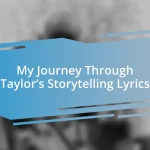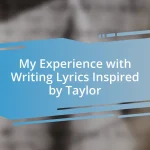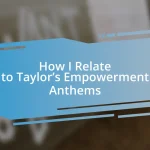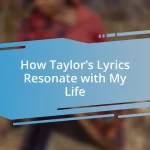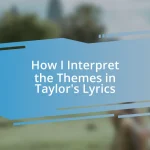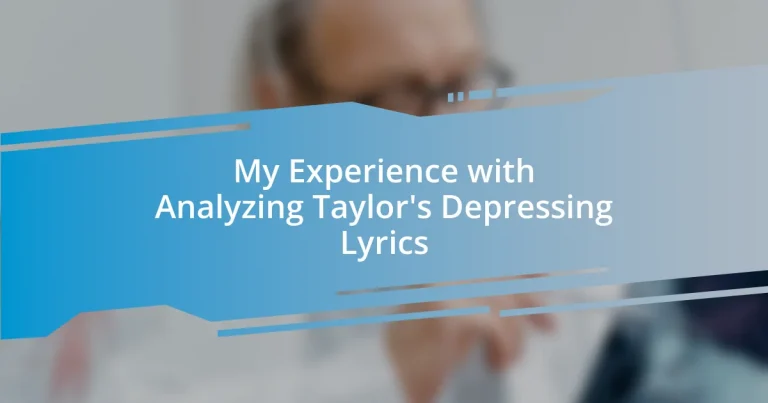Key takeaways:
- Taylor Swift’s lyrics resonate on a personal level, evoking complex emotions such as love, heartbreak, and self-reflection, leading listeners to reflect on their own experiences.
- Thematic elements in her songs often explore nostalgia and vulnerability, utilizing vivid imagery that allows for deep emotional connections and communal experiences among listeners.
- Analyzing her lyrics can foster personal growth and understanding, as they reveal shared struggles and triumphs, creating a bond that transcends individual experiences.
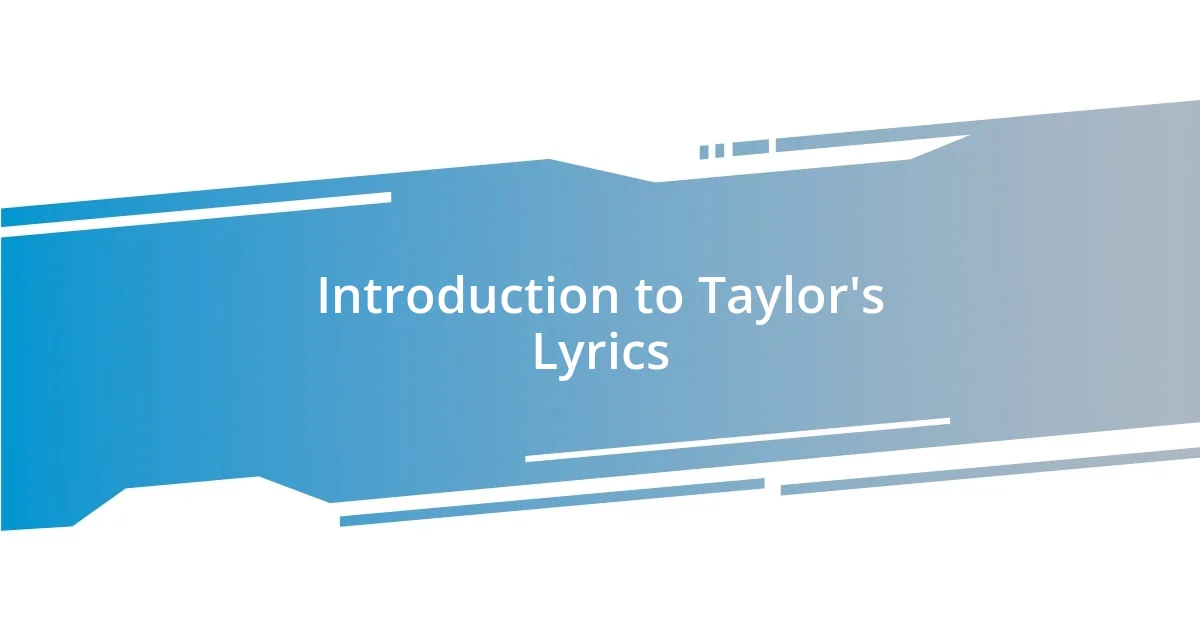
Introduction to Taylor’s Lyrics
Taylor Swift’s lyrics have a remarkable way of striking a chord with listeners, don’t they? Each line often feels like a glimpse into her thoughts and emotions, making it easy to connect with her narratives. I’ve found myself pausing over certain phrases that resonate deeply, as if she’s put into words experiences that I thought were uniquely my own.
What fascinates me about Taylor’s music is how she delves into complex emotions, often turning sadness into crystal-clear storytelling. I remember listening to “All Too Well” for the first time, and it hit me with such intensity that I felt like I was reliving a memory I hadn’t even experienced. It’s in those moments that I truly appreciate her ability to transform vulnerability into art, making her lyrics feel almost therapeutic.
When I analyze her songs, I notice the intricate details that reflect her personal journey—loss, love, and self-discovery, all wrapped into poetic verses. How does she manage to convey such raw emotion while weaving in relatable experiences? It’s a skill I admire, and it encourages me to reflect on my own feelings through the lens of her lyrics, sparking a deeper appreciation for both her artistry and the shared human experience.
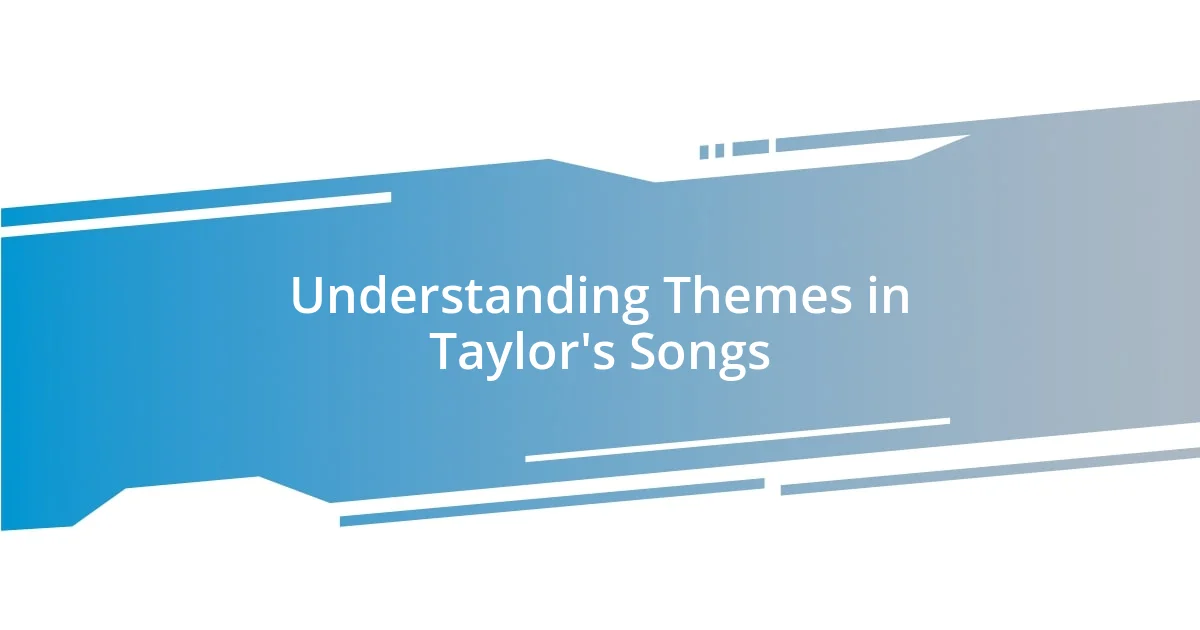
Understanding Themes in Taylor’s Songs
Understanding Themes in Taylor’s Songs
The themes in Taylor Swift’s songs often revolve around love, heartbreak, and self-reflection. I’ve noticed she paints vivid pictures that take us through the phases of relationships, from the initial spark to the painful aftermath. Listening to “Back to December” always feels like a bittersweet reminder of times when regret and longing collide, leaving me ruminating on my past decisions long after the song ends.
What strikes me most is her ability to explore the darker side of experiences, such as loss and vulnerability. In “The Archer,” I often find myself grappling with the feeling of uncertainty and fear of failure that she so eloquently captures. That line, “I’ve been the archer, I’ve been the prey,” makes me consider my own battles and how we all fluctuate between strength and fragility.
Additionally, Taylor’s storytelling often unfolds through a lens of nostalgia. In analyzing “Fifteen,” I recall my own high school days and the innocence I thought would never fade. It’s astonishing how her lyrics can evoke memories that are both beautiful and painful, ultimately leading me to a deeper understanding of my own growth and experiences.
| Theme | Example Song |
|---|---|
| Love | “Lover” |
| Heartbreak | “All Too Well” |
| Self-discovery | “The Archer” |
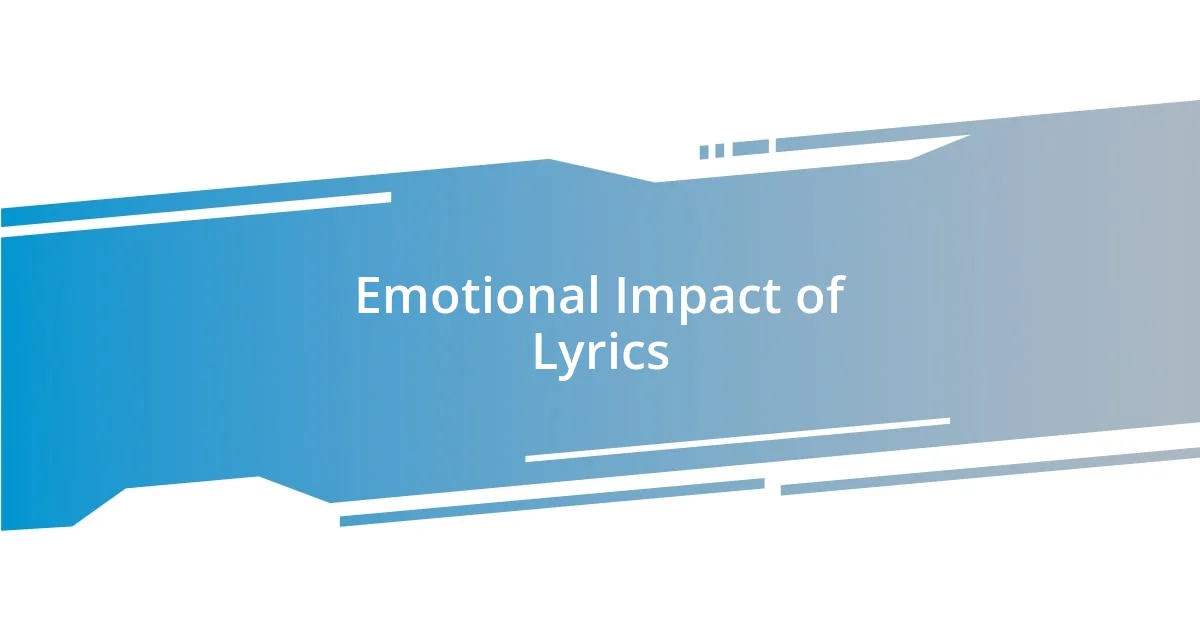
Emotional Impact of Lyrics
The emotional impact of lyrics is something I’ve always found fascinating, especially in Taylor Swift’s work. Her ability to convey heartbreak through simple yet poignant lines can leave me feeling vulnerable and exposed. I can recall the first time I heard “Sad Beautiful Tragic.” I was sitting by the window, rain softly tapping against the glass, and Taylor’s haunting lyrics felt like an echo of my own unspoken sentiments. It’s moments like these that remind me just how powerful a few carefully chosen words can truly be.
- Swift’s lyrics evoke a range of emotions, from nostalgia to heartache.
- Many listeners resonate with her themes of regret and longing, which can trigger personal reflections.
- The relatable nature of her storytelling often creates a sense of shared experience, making it easier to process our own emotions.
Often, I find Taylor’s lyrics challenge me to explore my feelings more deeply. For instance, “The Story of Us” makes me reflect on the complexity of relationships—I remember a time when a dear friend and I drifted apart, and those lyrics encapsulated the confusion and sadness I felt. It’s not just about the sadness; it’s about learning how to confront those feelings and understand their role in my life. In analyzing her work, I realize it’s just as much about the healing and acceptance as it is about the pain itself.

Analysis Techniques for Song Lyrics
When analyzing song lyrics, I often start by examining the underlying emotions that the artist conveys. Taylor Swift, for example, invites listeners into her world through her use of vivid imagery. In “Dear John,” I remember sitting in my car, and as I listened to her recount feelings of betrayal, I couldn’t help but think about my own past experiences with broken trust. This personal connection strengthens my analysis, allowing me to uncover layers of meaning that might otherwise be overlooked.
Another technique I find effective is looking for recurring motifs and symbols within her lyrics. Take the recurring theme of autumn, which I noticed in songs like “All Too Well.” It often serves as a metaphor for change and reflection. I’ve often found myself reminiscing about autumn evenings spent with friends, which makes me reflect on how time can blur the lines between joy and sorrow. Those nostalgic scenes in her lyrics resonate deeply, highlighting the complexities of moving on while cherishing fond memories.
Engaging with the lyrics on a deeper level can also involve considering the narrative structure of the songs. For instance, Swift’s use of storytelling techniques turns her experiences into relatable tales. I found myself captivated by “The Last Great American Dynasty,” where her storytelling made me realize how history often repeats itself in our lives. Isn’t it interesting how her lyrical narratives prompt us to think about our own stories? Through such analysis, I see not just the sadness but also the empowerment that comes from sharing experiences, making her songs resonate even more profoundly for me.
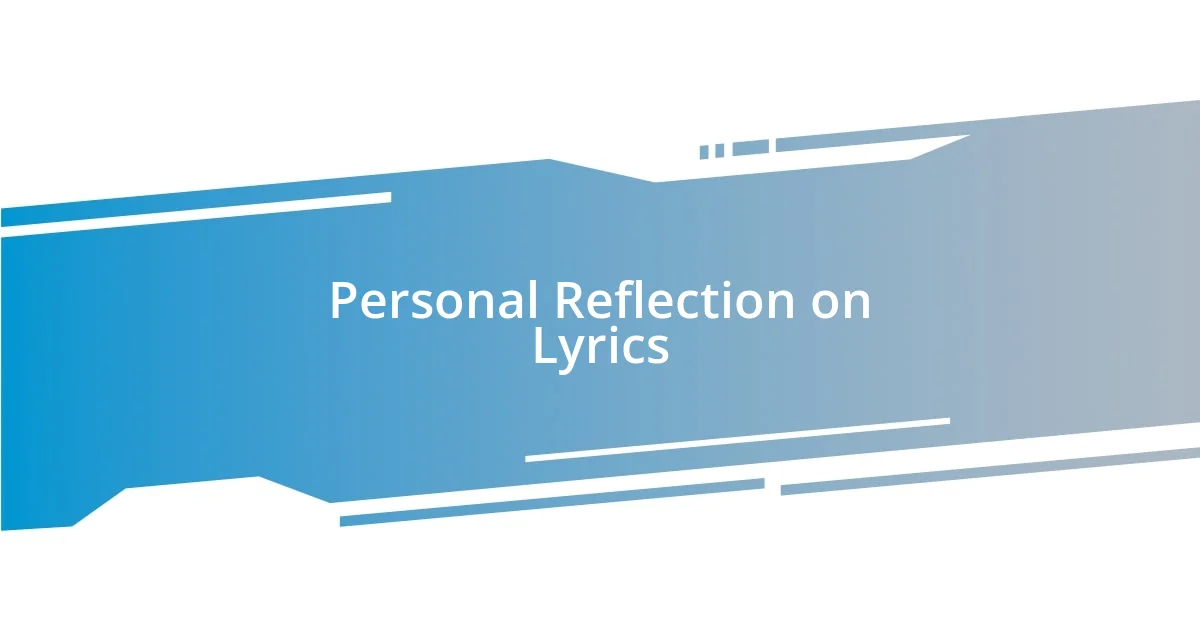
Personal Reflection on Lyrics
There’s something truly intimate about engaging with lyrics on a personal level. I’ll never forget the moment I heard “All You Had to Do Was Stay.” I was on a long train ride, staring out the window at the passing scenery, and the lyrics hit me like a wave of nostalgia. They made me recall a relationship where I had wished so desperately for someone to just understand my feelings. It made me ponder: how often do we fail to express our true selves, and how does that silence impact our connections?
The beauty of Swift’s lyricism lies in her ability to articulate feelings that often feel too heavy to speak. “Back to December” profoundly resonates with me, stirring feelings of regret and reflection. I remember a late-night drive when those lyrics played, triggering memories of a missed opportunity with someone special. It’s one of those moments that prompts a flood of emotions, reminding me how vulnerability in songwriting can spark dialogues within myself that I might ignore otherwise. Why do we shy away from confronting our choices, and how can these reflective moments lead us toward personal growth?
Analyzing these lyrics not only opens up pathways to my feelings but also serves as a mirror for my experiences. I find that when I listen to “The Archer,” I’m taken back to times of uncertainty in my own life. It’s in those reflective moments that I ask myself—what am I truly afraid of? It’s interesting how these lyrics can weave together threads of my life story, often guiding me to navigate through my own shadows. Each song becomes a chapter—a shared experience that resonates deeply, urging me to embrace both the melancholy and the lessons contained within.

Connecting with Audiences Through Lyrics
Connecting with audiences through lyrics is an incredibly powerful phenomenon. I remember the first time I listened to “The Story of Us.” The imagery of a deteriorating relationship felt so familiar, like reading my own diary entries. It made me reflect on how effective lyrics serve as a catalyst, helping us articulate feelings we sometimes struggle to express. Isn’t it fascinating how a few lines can make us feel seen and understood?
When artists like Taylor Swift weave a story into their lyrics, they invite us to become a part of that narrative. I can still picture myself in my favorite café, sipping coffee while listening to “Clean.” The emotions poured from the speakers, washing over me like a cleansing rain after a storm. Each word resonated with my own journey of personal healing. It’s a reminder that vulnerability in music makes us feel less alone; it builds a bridge between the artist and the listener.
Moreover, the experience of connecting with lyrics isn’t just about personal reflection; it creates a shared communal experience. I remember hearing “Shake It Off” at a concert, surrounded by people all singing along as if we were one voice. In that moment, I felt a sense of unity—like we were all letting go of our worries together. How often do we find solace in the shared expressions of joy and pain as they echo in our lives? That connection is something truly magical, and it’s often hidden beneath the surface of the music we love.

Conclusion and Key Takeaways
Engaging with Taylor Swift’s lyrics has taught me that even the darkest themes can foster understanding and connection. Reflecting on songs like “All Too Well,” I’ve found myself reliving bittersweet moments in my own life. Aren’t those recollections both painful and healing? It’s a delicate balance, but that’s where the beauty lies—in embracing our vulnerabilities together.
One key takeaway from my analysis is the extraordinary capacity of lyrics to provoke thoughts and emotions we often keep buried. For instance, I vividly remember contemplating my past while listening to “Dear John.” Those lyrics made me question my patterns in relationships and how past traumas shape our present. It’s eye-opening to realize just how much we can learn about ourselves through the lens of another’s experience, isn’t it?
Ultimately, it’s clear that Swift’s songwriting invites us to not only reflect individually but also to connect as a community. Whether it’s sharing a knowing glance with a stranger during a heartfelt bridge or discussing our interpretations with friends, these moments create bonds that transcend the music itself. How powerful is it to know that through her words, we are all part of a larger narrative, one that acknowledges our shared struggles and triumphs?
